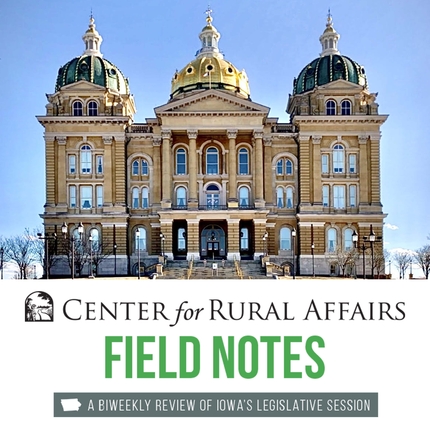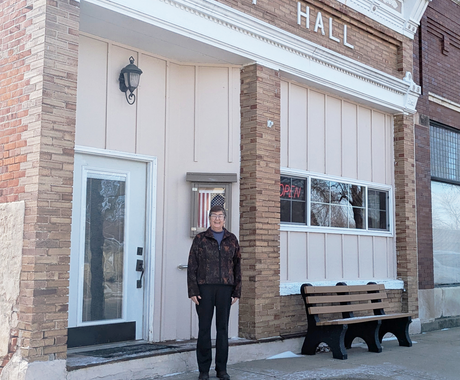By Kate Hansen, former staff member
The Iowa Legislature's 2022 session is now in its seventh week. Lawmakers have been busy with quick-moving committee and subcommittee work ahead of the first funnel deadline. If a bill did not pass out of its committee in the chamber it originated in by last Friday, it is effectively dead, with some exceptions, such as tax and spending bills.
This week, the Senate and House will only consider bills, joint resolutions, and unfinished business from their own chambers.
Center staff have been busy tracking and weighing in on legislation, including submitting comments in support of establishing a shared solar net metering cooperative program and implementing the recommendations of the Artisanal Butchery Task Force.
We also hosted a Rural Resiliency Forum with Rep. Norlin Mommsen featuring local rural leaders in his district. If you missed it, you can watch the recording here.
If you have any questions, or would like to share the rural issues that are important to you, please do not hesitate to reach out to me at [email protected] or 515.215.1294.
Thank you for making your rural voice heard.
Water quality
Senate File (SF) 2206 — For, with note: Introduced by Senate Ways and Means Chair, Sen. Dan Dawson, this legislation is a multi-faceted tax package, formerly Senate Study Bill (SSB) 3074. The Center is registered in support, specifically for section 206 as it relates to the Local Conservation Partnership Program and Watershed Management Authorities. A committee report approving this bill was published on Feb. 7, and a fiscal note was published on Feb. 16.
House File (HF) 2166 — For: Introduced by State Government Committee Chair, Rep. Bobby Kaufmann, this bill designates certain county flood mitigation activities as essential county purposes. Additions include the reconnection of floodplains, and wetland and oxbow lake restoration.
House Study Bill (HSB) 536 — Against: Introduced by Commerce Chair, Rep. Shannon Lundgren, this bill would restrict counties and cities from adopting, enforcing, or otherwise administering regulations on stormwater that exceed or conflict with federal or state regulations.
Renewable energy
HF 2395/SF 2326 — For: Introduced by Rep. Michael Bergan on Feb. 15, this bill would pay out the Iowa Solar Energy Tax Credit residential waitlist. The tax credit would be available to any homeowner who installed solar during the 2021 calendar year. The deadline for anyone who has not yet submitted a tax credit application has been extended to June 30.
HSB 697 — For: Introduced by House Agriculture Committee Chairperson, Rep. Ross Paustian, on Feb. 9, this bill creates a shared solar net metering cooperative. This bill would allow for virtual net-metering of community solar for behind-the-meter facilities of 1 megawatt or less and allows for up to 10 investors. HSB 697 also allows Iowa farmers, school districts, businesses, cities, and counties with solar arrays in multiple locations to consolidate their multiple meters onto one virtual meter. This bill would save Iowans with solar money on their electricity bills by crediting the customer for excess energy produced proportionate to the size of the investors solar subscription and would open up investment in a local and renewable source of energy to more Iowans. The bill passed out of subcommittee by a 2-0 vote on Feb. 14. It now goes to the full Agriculture Committee.
SF 2321 — Against: Previously SF 2127, this legislation was introduced by Senate Agriculture Committee Chairperson, Sen. Dan Zumbach, and passed out of subcommittee on Feb. 2. The bill provides that the owner or manager of agricultural land shall not install a commercially-owned solar panel field unless it has a Corn Suitability Rating of 65 or lower, which would prohibit solar developments in 63 of Iowa’s 99 counties. The bill also requires solar panel fields to be at least one-half mile from the next solar panel field and a setback distance of 1,250 feet from the nearest neighboring landowner. On Feb. 15, the bill was voted out of the Agriculture Committee with a 7-5 vote.
Rural development
HF 2470 - For: Introduced by Rep. Chad Ingels, this legislation would implement the recommendations of the Artisanal Butchery Task Force instituted by the Legislature in 2021. Recommendations include establishing a framework for a one-year community college certificate butchery education program, developing a library of resources for Iowa-based meat processing businesses, and building out a direct-to-consumer toolkit. On Feb. 15, the Economic Growth Committee recommended an amendment and passage.
HF 2322 - For: Introduced by Rep. Chad Ingels, this bill would make changes to membership of the Local Food and Farm Program Council. Required members would include four farmers producing commodities used to prepare or process a local food, three managers of food establishments actively purchasing local foods, and four heads of local or regional community food organizations.
Other bills of interest
HSB 663/SSB 3118 — For: This bill would allow a governmental body to conduct a meeting by electronic means if it otherwise complies with standard open meetings procedural requirements. Effectively used during the pandemic, an option for electronic meetings could have positive effects, particularly among rural and distantly-located participants. In the House, the bill was returned to the Committee on Local Government by its subcommittee without recommendation on Feb. 15.
HF 2317 — Undecided: House Republican tax package, previously HSB 626. This legislation passed the House on Feb. 16 by a 61-37 vote. It now heads to the Senate.
HSB 551/SSB 3044 — Undecided: Gov. Kim Reynolds’ tax packages introduced in the House and Senate, respectively.





